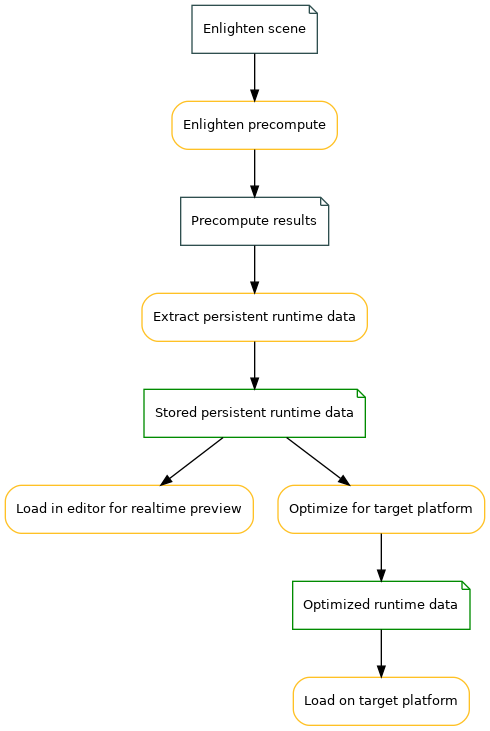| Table of Contents | ||||||||
|---|---|---|---|---|---|---|---|---|
|
...
The diagram below shows how data flows from the Enlighten scene to the persistent runtime data.
| Excerpt | ||
|---|---|---|
| ||
The precompute process stores the result of the precompute in the precomp and radiosity sub-directories within the __Build_<scene>__ directory at the scene root. When the precompute process completes successfully, extract the persistent runtime data from these locations and store it in a form ready to be loaded by the game runtime and editing tools.
...
| Note |
|---|
The exported Enlighten scene and the intermediate data in __Build_<scene>__ are used only by the precompute and debugging tools, and are not required for runtime radiosity updates. For a prototype implementation you might load files from the __Build_<scene>__ directory directly in your game runtime, but this would not be practical in a production implementation. |
Data layout
Enlighten runtime data is grouped into separate objects for each system, probe set and cubemap.
To find the automatically generated systems in a zone, load the IPrecompGeneratedSystems object.
| Code Block |
|---|
// path: "precomp/[zone name].gs"
const Enlighten::IPrecompGeneratedSystems* generatedSystems
= Geo::LoadInterfaceCompressed<Enlighten::IPrecompGeneratedSystems>(path);
for (Geo::s32 systemIndex = 0; systemIndex != generatedSystems->GetNumSystems(); ++systemIndex)
{
const Enlighten::IPrecompInputSystem* inputSystem = generatedSystems->GetSystem(systemIndex);
Geo::GeoFileString systemName(inputSystem->GetName());
// extract radiosity data associated with this system
} |
To find the automatically generated probe sets in a zone, load the IPrecompOutputProbeOctree object.
| Code Block |
|---|
// path: "precomp/[zone name].opo"
const Enlighten::IPrecompOutputProbeOctree* probeOctree
= Geo::LoadInterfaceCompressed<Enlighten::IPrecompOutputProbeOctree>(path);
for (Geo::s32 probeSetIndex = 0; probeSetIndex != probeOctree->GetNumProbeSets(); ++probeSetIndex)
{
Geo::GeoFileString probeSetName = Geo::GeoFileString::Printf("%s_%d", probeOctree->GetName(), probeSetIndex);
// extract radiosity data associated with this probe set
} |
...
| Tip |
|---|
If you choose to use explicit system groups or manually placed probes, keep track of the system and probe set names in the same way. |
We recommend to combine all systems, probe sets and cubemaps in a single zone into a single chunk for efficient load in your runtime file-system.
Below is a practical example of the data layout for a single chunk:
- for each lightmap UV set
- for each lightmap-lit system
- lightmap-lit system radiosity data
- for each probe-lit system
- probe-lit system radiosity data
- for each lightmap-lit instance
- instance GUID
- pointer to lightmap UV set
- lightmap UV transform
- index of lightmap-lit system
- for each probe set
- probe set radiosity data
- for each cubemap
- cubemap radiosity data
| Tip |
|---|
We recommend to compress each chunk of persistent runtime data on disk to save space and speed up loading. |
...
